In the UK, electric cars are becoming a viable alternative for both buying and leasing.
To move things along, there are grants available if you want to get electric vehicles for your business.
But why should you lease an electric car? Cost and availability of charging points are a barrier to switching for some drivers, which suggests that leasing could be the better option for electric vehicles in the short-term.
Is leasing an electric car right for me?
We chat to Paul Barker, editor of Company Car Today, about the considerations small businesses should make when leasing an electric car and the benefits having one (or more) can bring to your business.
Read on for the full interview or jump straight to the relevant section for you.
On this page:
- Key considerations when leasing
- The costs
- Leasing vs buying
- The benefits of going electric
- Plug-ins vs fully electric
- The 8 best electric cars to lease
What considerations should small businesses make when leasing an electric car?
The key thing is an understanding of how you’re going to use the car. Electric vehicles make a massive amount of sense as long as you’re doing the right kind of mileage. As weird as it sounds, it’s about doing enough miles as well as not too many.
A lot of the electric vehicle ranges are around the 200-mile mark between charges if you’re picking up some of the newer ones. If you’re not doing enough miles, it doesn’t make enough sense financially compared to a small capacity petrol engine.
The key saving financially from an electric car – as well as company car tax and national insurance – is on the fuel itself. Drivers charging on an electric vehicle tariff can save over 56 per cent compared to petrol or diesel per mile, according to drivetech. If you’re not using enough fuel, you’re not making the saving you would if you were to lease a small petrol engine instead.
Why does it cost more?
A combination of things – first of all, the technology is more expensive. As we’ve had 130 years of petrol cars, the production process is as refined as it can be. With an electric car it’s in its infancy. Some parts of the batteries are still quite difficult to source. Research from electrifying.com shows that the average wait for a new electric car in October 2022 was 35 weeks.
Other considerations include making sure the charging infrastructure is there to back up your electric vehicle. If it’s a car that employees are going to use – particularly if it’s a plug-in hybrid rather than fully electric – make sure they can charge them at home as well. There’s now a grant to go towards a home charging point which is really useful.
Unfortunately, some companies buy plug-in cars rather than electric for tax reasons and then they never find a charging socket, so you’ve got to make sure the company policy works around people charging them. Electric cars are a bit simpler – as long as the car fits the purpose, you haven’t got the option of not charging it.
You’ve also got lower servicing costs and if you’re going in and out of London then you’re missing the congestion charge. At the time of updating, the daily charge is £15 if you drive within the charge zone 7:00-18:00 Monday- Friday and 12:00-18:00 on Saturdays, Sundays and bank holidays. Only battery electric or hydrogen fuel cell vehicles are eligible for the cleaner vehicle discount. From December 25 2025, the cleaner vehicle discount will be discontinued.
It’s only going to get bigger – Birmingham and Manchester have recently introduced low emissions zones. As more clean air zones pop up around the country then electric cars make a lot more sense for people going in and out of those areas.
With all this said, you’ve got to accept the fact that an electric vehicle is going to cost you more initially.
Does that mean it’s better to lease than buy an electric vehicle at this point?
It could be as the technology is moving very quickly. For example, the second-generation Nissan Leaf was launched at the beginning of 2018 with a range of under 200 miles. The latest model has a range of up to 239 miles.
As batteries are getting better, cars are upgraded mid-life. At least if you’re leasing rather than buying, you’re not exposed to any potential residual impact value of that. It might be that the older cars with lower ranges aren’t as desirable on the used car market. You find the values are dropping quicker than you might have expected.
Leasing is becoming the increasingly intelligent way of doing it because a) they’ve now got sensible residual values and b) it means the leasing company rather than person involved is exposed to the risk of that.
What benefits does leasing an electric car have for business?
It depends on the business – if it’s one that’s customer-facing and based in a city centre then there’s a lot of benefit from the corporate social responsibility (CSR) side where you can show your business is doing something to help the environment. There’s a lot of emphasis at the moment around urban pollution from vehicles.
People love driving them as well. The performance is instant compared to the lag you get with petrol and diesel vehicles. They’re also a lot more relaxed coming out of an electric vehicle than they are petrol vehicle because there’s an almost therapeutic angle to driving a car that makes no noise.
How does leasing a plug-in hybrid compare to leasing a fully electric vehicle?
Plug-in hybrids tend to be slightly more expensive if anything as they’ve got the two power trains.
With these vehicles you’re more likely to be doing high range mileage, so it makes sense to have the back-up of the petrol power. It’s a different market.
Which electric cars are best for leasing?
Before we set off, here are a couple of definitions to help you out. The traditional test for electric vehicles is the New European Driving Cycle (NEDC) but has since been replaced by the Worldwide Harmonised Light Vehicle Test Procedure (WLTP). These mark out how certain standards of the car will be measured like average mileage on full charge and average speed. The WLTP ranges below are the averages based on a full charge.
The charging times listed are based on household mains plugs. They’ll differ from a roadside charging point or the specialist wallbox that you can buy and plug in at home.
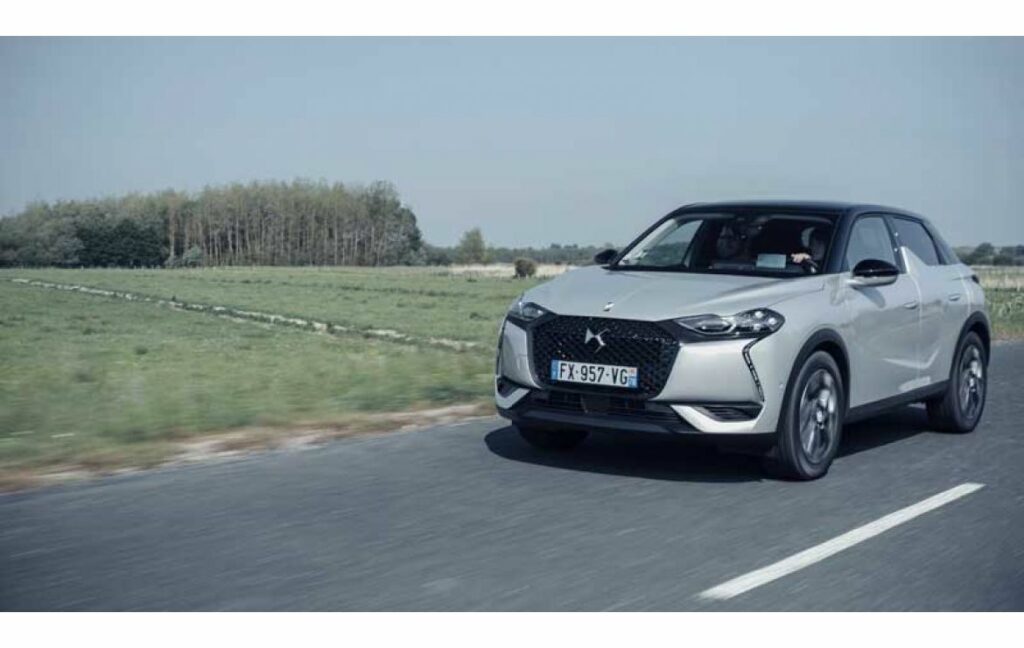
DS 3 Crossback E-Tense
https://www.dsautomobiles.co.uk/models/ds3.html
WLTP range: 212 miles
Charging time: 31 hours
Features
- Choice of powertrain options
- Personal assistant with touchscreen and advanced voice recognition
- DS Drive Assist recognises speed and distance from the vehicle in front as well as where they are in their lane
- Intuitive LED lighting
- Augmented Reality display in driver’s eyeline
- Front and rear digital cameras
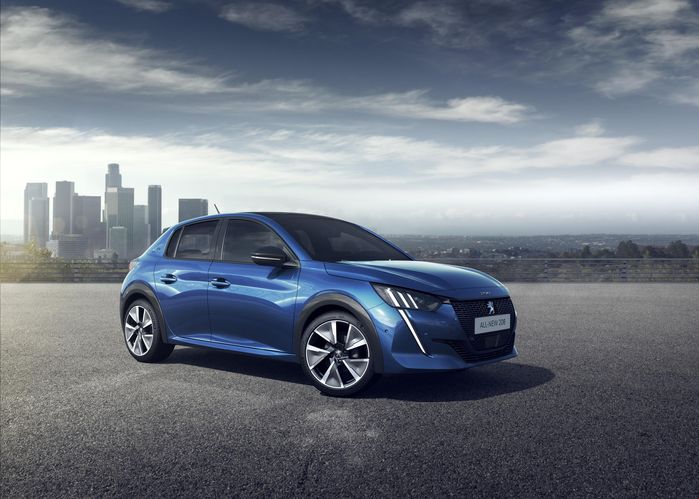
Peugeot e-208
https://business.peugeot.co.uk/business-models/208.html
WLTP range: 225 miles
Charging time: 31 hours
Features
- 3-claw full LED headlights
- Multifunction steering wheel
- Choice of interior ambient lighting in eight colours
- Use apps from your smartphone on the central screen
- Configure info on dashboard
- Wireless smartphone charging
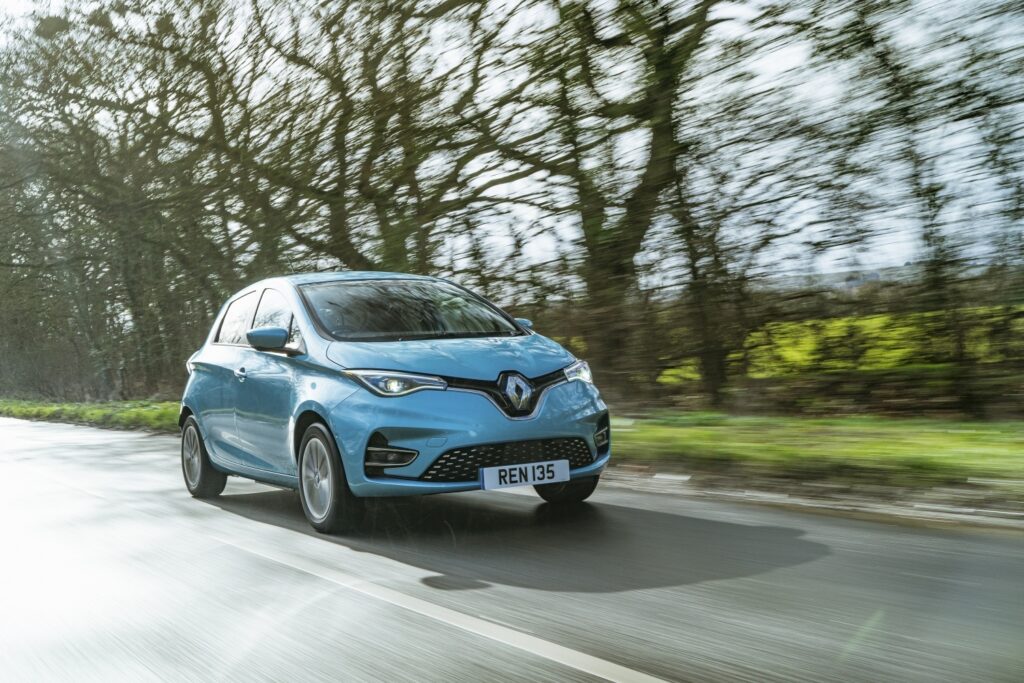
Renault Zoe
https://www.renault.co.uk/electric-vehicles/zoe.html
WLTP range: 246 miles
Charging time: 9 hours 30 minutes
Features
- B mode – to increase the amount of energy that is generated into the battery when you are decelerating
- Advanced driving assistance – alert you to vehicles entering your blind spots plus an easy park system
- Available in seven colours
- Automatic climate control
- Use apps on a central touchscreen
- Overspeed prevention
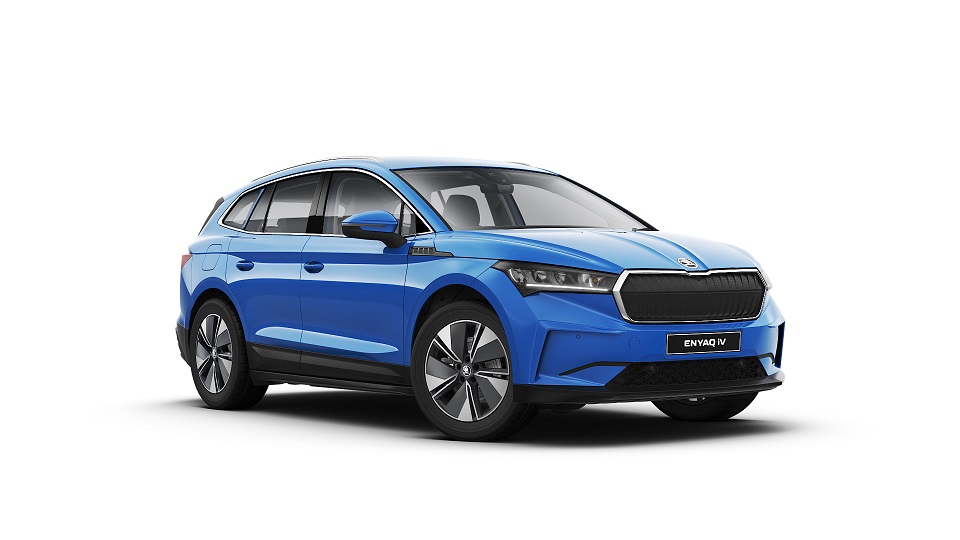
Skoda Enyaq iV
https://www.skoda-auto.com/models/range/enyaq-iv
WLTP range: 272 miles
Charging time: 39 hours
Features
- Driver assistance systems
- Infotainment system with built-in eSIM
- Umbrella compartment
- Foldable tables on back of seat
- Phone box with wireless charging
- WiFi connection for passengers’ devices
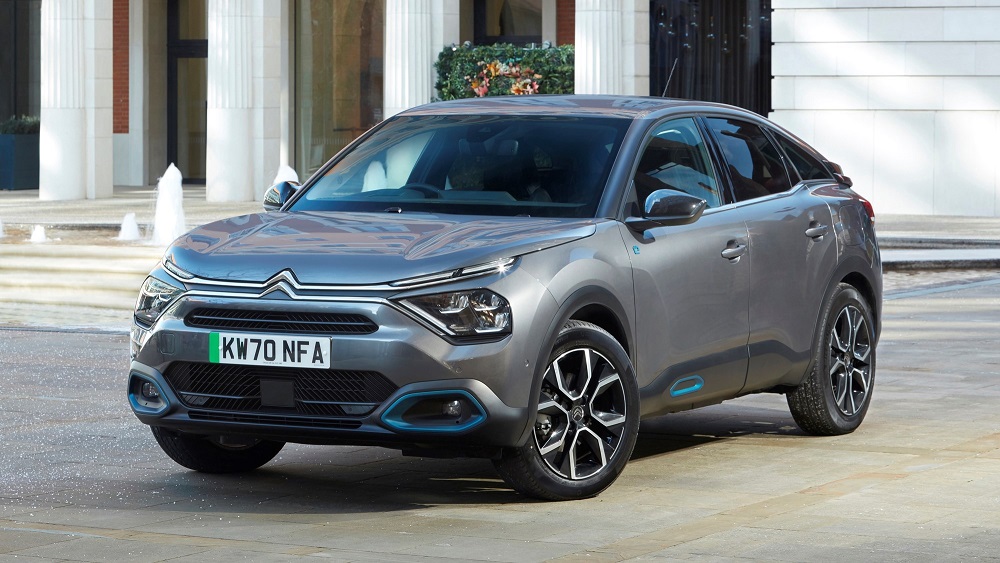
Citroen e-C4
https://business.citroen.co.uk/models/c4-e-c4.html
WLTP range: 222 miles
Charging time: 31 hours
Features
- Emergency call and assistance service
- Use smartphone apps on your touchscreen tablet
- Adaptive cruise control
- 198mm legroom in the back seats
- Active safety brake

Fiat 500 Electric
https://www.fiat.co.uk/500-electric/all-electric-500-hatchback
WLTP range: 199 miles
Charging time: 19.25 hours
Features
- Available in six colours
- Assisted driving level 2 – picks up first signs of fatigue through lateral movement
- Electric handle
- Sherpa mode to save energy
- Contact roadside assistance from the car’s touchscreen
- One-pedal driving (accelerate and decelerate with the right pedal)
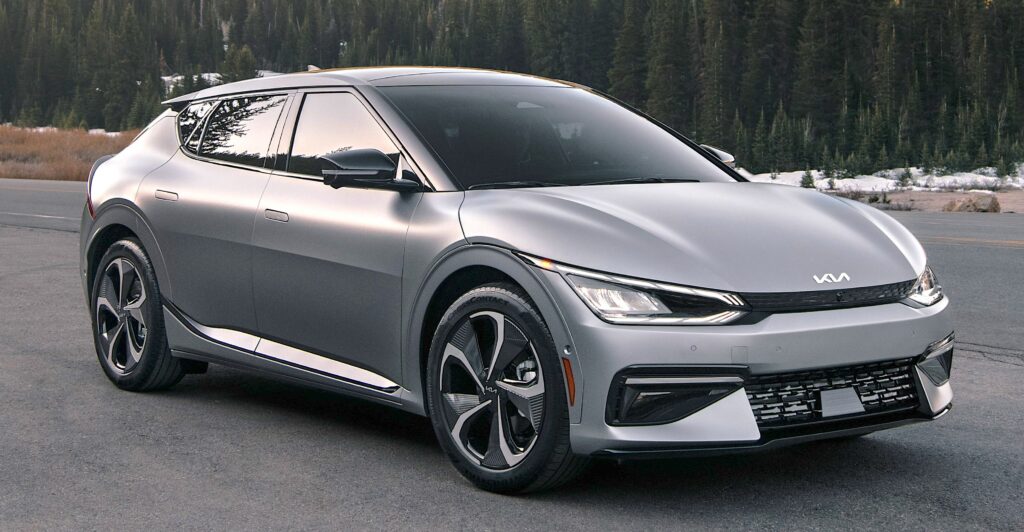
Kia EV6
https://www.kia.com/uk/new-cars/ev6/
WLTP range: 255 miles
Charging time: 11 hours
Features
- Intelligent front lighting system
- Flush exterior door handles
- Advanced safety features
- Augmented reality window display
- Meridian premium sound system
- 12.3-inch displays
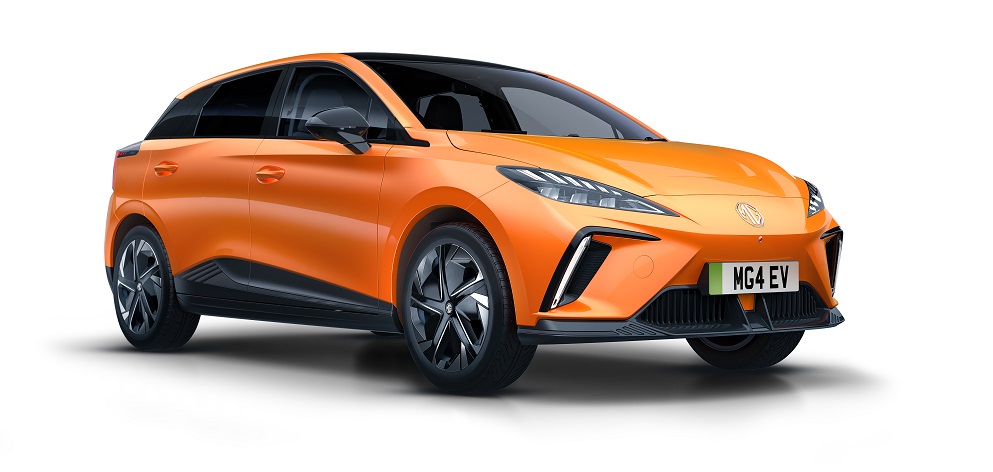
MG Motor UK MG4
https://www.mg.co.uk/new-cars/mg4-ev
WLTP range: 218 miles
Charging time: 10 hours
Features
- iSmart user app
- Driver assistance systems
- Different colours available (including volcano orange, pictured)
- Generous headroom and legroom
- Smartphone app connectivity
- In-app climate control
Read more
Preparing your business for the electric revolution
Business leases for electric cars – could you save your business money?